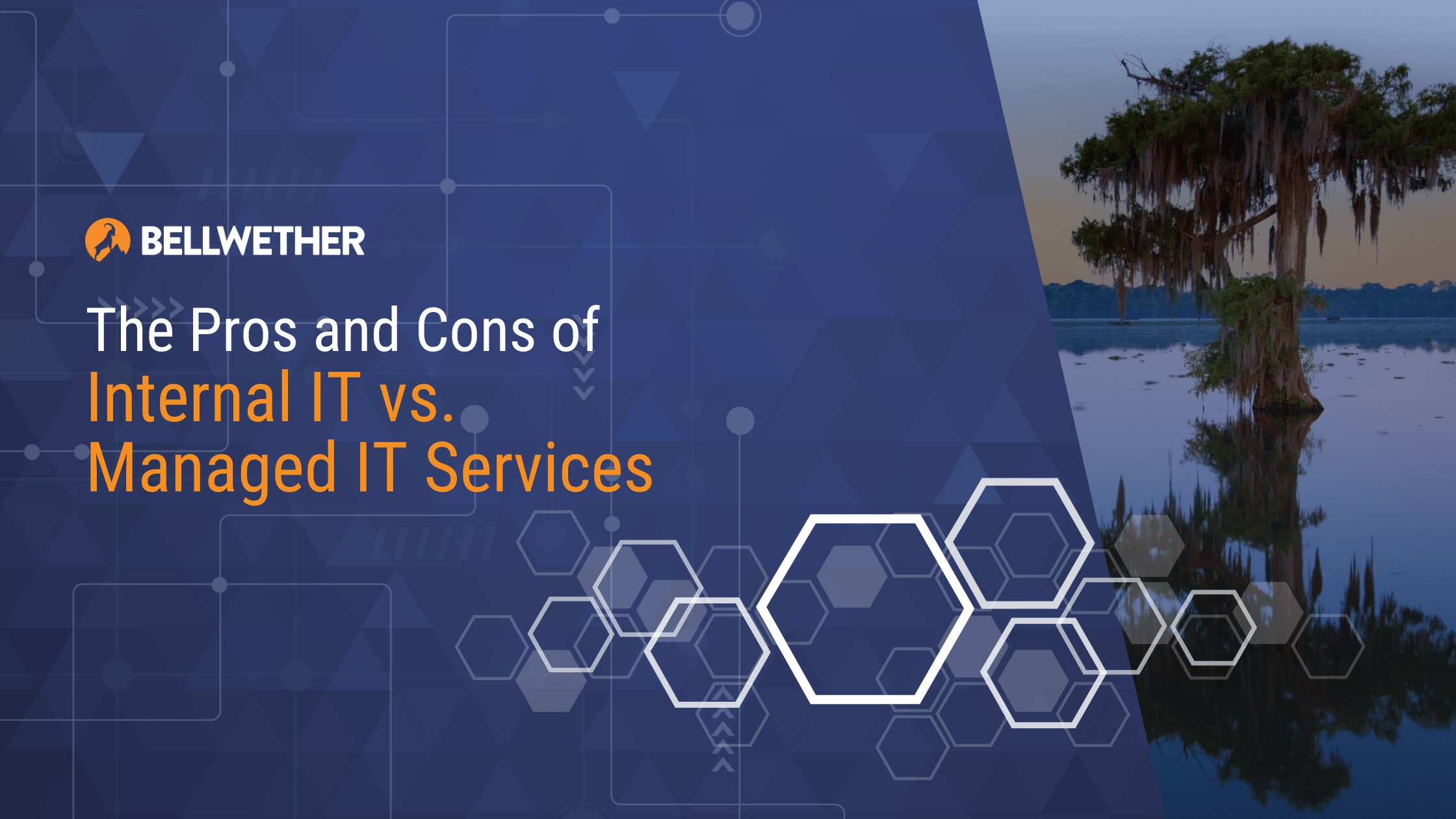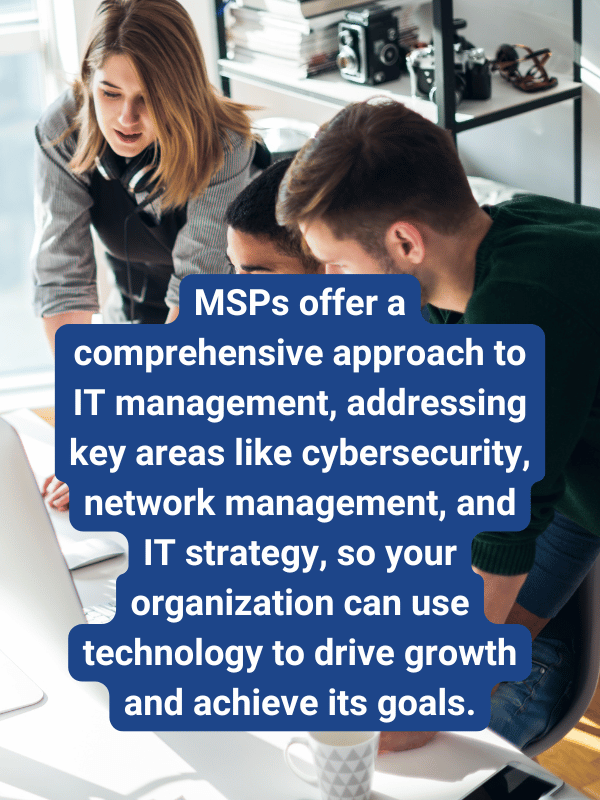
When small business leaders face IT challenges, they often wonder: should we stick with internal IT staff, or is it time to partner with a managed service provider (MSP)? Evaluating an MSP vs internal IT requires the consideration of several key pros and cons, especially if your organization is in a time of growth or change. Whether it’s due to an IT manager’s departure, rapid company growth, or a cyber-attack, this decision can have lasting impacts on your business.
To help you in your evaluation, here are some pros and cons of internal IT compared to hiring an MSP:
- Keep Doing What You’re Doing with Internal IT
- Go a New Direction and Partner with an MSP
- Covering All the IT Bases
- Managed IT Services for Small Businesses
Keep Doing What You’re Doing: Pros and Cons of Internal IT
It’s natural to want to stay with what you know, and having an internal IT team offers some clear advantages.
Pros of Internal IT
1. Always Onsite Staff

Having IT staff onsite means they can respond in-person to support requests. For businesses that rely heavily on immediate, hands-on assistance, this is a significant benefit. However, smaller teams may not have the bandwidth to dedicate one person solely to help desk tasks.
2. Relationships with Employees
Internal IT staff can build strong relationships with colleagues through shared experiences and day-to-day interactions. When IT personnel excel at communication, this familiarity can make problem-solving more efficient.
3. Knowledgeable About Your Business
Internal IT staff can develop a deep understanding of your specific operations, processes, and goals. This expertise allows them to customize solutions and quickly adapt to unique challenges.
Cons of Internal IT
1. Staff Turnover
The competitive IT job market means turnover is a constant risk. Recruiting, training, and retaining talent can strain resources. When gaps in staffing occur, they can disrupt operations and increase stress across the organization.
Related: 5 Ways Managed IT Services Solve Your IT Staffing Problems
2. Reliance on Institutional Knowledge
When a key IT staff member leaves, they may take crucial knowledge about your systems with them. Without thorough documentation of what they know and how they do things, onboarding replacements can be slow and costly.
3. Inconsistent Coverage
Vacations, sick days, and unplanned absences can leave gaps in IT support. While advanced planning helps, limited staffing often means work piles up during absences.
4. Limited Knowledge
IT encompasses multiple disciplines—networking, cybersecurity, strategy, and more. A small internal team may lack the diverse expertise needed to cover all areas effectively.
5. Limited Bandwidth
With only so many hours in the day, small IT teams often prioritize immediate issues, leaving critical tasks like system maintenance or upgrades unfinished. This can lead to long-term risks, including system failures.
6. Resistance to Change
Adopting new technologies or processes often comes with a learning curve. Overburdened IT staff may resist these changes, delaying progress and innovation.
7. Leadership Deficiency
Strategic IT planning requires a level of leadership that many internal teams lack. Without expert guidance, businesses may struggle to align IT investments with long-term goals.
Related: IT Not Serving Your Business? It’s Time for Managed IT Services
Go a New Direction and Partner with an MSP: Pros and Cons of Managed IT Services
For many businesses, partnering with a managed service provider can address gaps in IT expertise, coverage, and strategy.
Pros of Managed IT Services
1. Access to Every IT Specialty

With an MSP, you gain access to a team of experts covering all IT disciplines. This breadth of knowledge is included in your monthly fee, delivering capabilities that would be impractical to hire in-house. Plus, with AI-powered tools increasingly becoming part of an MSP’s toolkit, you gain access to cutting-edge technologies that can automate routine tasks, optimize network performance, and enhance cybersecurity monitoring.
2. Alignment of Job Roles with Personalities
MSPs staff their teams based on individual strengths and interests, ensuring tasks align with natural aptitudes. This specialization minimizes dropped balls and enhances efficiency.
3. Better Management of Cyber Risks
Dedicated cybersecurity teams at MSPs monitor the evolving threat landscape and proactively adjust your defenses. They craft strategies tailored to your risk tolerance and compliance requirements. Additionally, MSPs increasingly utilize AI-driven threat detection technologies to proactively identify and mitigate potential cyber risks. These tools can analyze patterns in real time, offering a level of protection that goes beyond traditional monitoring methods.
4. Just Right Capacity
Small and medium-sized businesses rarely need full-time IT specialists in every role. MSPs provide the right level of support for each function and can scale services as your needs change.
5. Fast Response Time
MSPs often have service-level agreements (SLAs) guaranteeing quick response times. This ensures faster resolution of issues, boosting productivity and reducing downtime.
6. Knowledge Redundancy and Documentation
MSPs create and maintain comprehensive documentation of your IT systems, eliminating reliance on tribal knowledge. This practice reduces errors and ensures seamless continuity.
7. IT Guidance
With a virtual Chief Information Officer (vCIO), you gain strategic advice on technology planning and adoption. This expertise ensures your IT investments align with your business goals and deliver measurable results. AI insights can complement the strategic advice of a virtual Chief Information Officer (vCIO), helping identify trends and forecast future IT needs to align with your business growth.
Cons of Managed IT Services
1. Not Onsite
While MSPs provide remote support and regular onsite visits, they may not offer the same immediate presence as internal staff. For some businesses, this requires an adjustment period.
2. Get-to-Know-You Learning Curve
MSPs need time to understand the intricacies of your business and IT environment. However, this initial learning curve often leads to long-term efficiencies.
3. Different Type of Relationships with Employees
Although you’ll work closely with MSP staff, their external position means they won’t fully integrate into your company culture.
Covering All the IT Bases

Unless your business can staff every IT specialty, relying solely on an internal team may leave critical gaps that limit your ability to fully leverage technology. MSPs offer a comprehensive approach to IT management, addressing key areas like cybersecurity, network management, and IT strategy, so your organization can use technology to drive growth and achieve its goals.
For small businesses, MSPs offer scalable solutions that align with changing needs, ensuring technology supports growth rather than holding it back. By leveraging their expertise, businesses can reduce costs, improve efficiency, and focus on achieving their goals without being bogged down by IT challenges.
Managed IT Services for Small Businesses
At Bellwether, we provide managed IT services for organizations with 10 to 300 employees—all for a flat monthly fee. Our holistic approach to IT management empowers businesses to use technology strategically, improving risk management, technology planning, and the overall technology experience for employees and customers.
Get in touch today to explore what it would be like to have a managed IT services partner.
